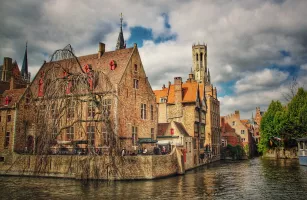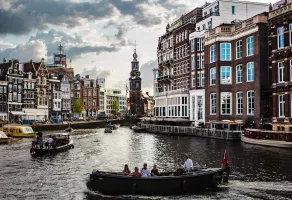Brussels Travel Guide
Brussels, the capital of Belgium, is a city known for its rich history, stunning architecture, and delicious cuisine. As the headquarters of the European Union, Brussels plays a significant role in global politics. The city's diverse cultural heritage, including French and Dutch influences, makes it a melting pot of art, music, and gastronomy. Brussels is famous for its iconic landmarks such as the Grand Place, Atomium, and Manneken Pis statue.Top Attractions in Brussels
- Grand Place
- Atomium
- Manneken Pis
- Royal Palace of Brussels
- Belgian Comic Strip Center
Brussels is Famous for
Chocolate and beer are two of the most famous things associated with Brussels.Top Attractions in Brussels
- Indulging in Belgian chocolates
- Exploring the historic architecture of Grand Place
- Visiting the Atomium for panoramic views
- Sampling Belgian waffles and fries
- Admiring the intricate comic strip murals
What's Great about Travelling to Brussels?
- Rich historical and cultural experiences
- Delicious cuisine and famous chocolates
- Great shopping opportunities for fashion and souvenirs
- Welcoming and friendly locals
What's Not So Great about Travelling to Brussels?
- Expensive compared to some other European cities
- Can be crowded with tourists, especially in peak seasons
- Weather can be unpredictable, with frequent rain
- Language barrier for non-French/Dutch speakers
Travel Tips for Brussels
- Check visa requirements before traveling
- Use public transportation like trams and metro for getting around
- Be cautious of pickpockets in tourist areas
- Try out local delicacies like moules-frites (mussels and fries)
Important Brussels trip information
- Ideal Duration: A minimum of 3-4 days is recommended to explore the city.
- Best Time to Visit: The best time to visit Brussels is during the spring (April to June) or fall (September to October) for pleasant weather and fewer crowds.
- Nearby Airports and Railway Stations: Brussels Airport (BRU) and Brussels Central Station are the main entry points to the city.
Top 11 Places to visit in Brussels
Per Person
1,85,500
*EXCLUDING APPLICABLE TAXES 5.0 Ratings
( 20 Reviews )
( 20 Reviews )
Total
4,63,000
*EXCLUDING APPLICABLE TAXES 5.0 Ratings
( 20 Reviews )
( 20 Reviews )
Per Person
1,62,000
*EXCLUDING APPLICABLE TAXES 5.0 Ratings
( 20 Reviews )
( 20 Reviews )
Total
5,58,500
*EXCLUDING APPLICABLE TAXES 5.0 Ratings
( 20 Reviews )
( 20 Reviews )
Total
5,55,000
*EXCLUDING APPLICABLE TAXES 5.0 Ratings
( 20 Reviews )
( 20 Reviews )
Total
3,94,500
*EXCLUDING APPLICABLE TAXES 5.0 Ratings
( 20 Reviews )
( 20 Reviews )
FAQ's on Brussels
Q1: What is the best time to visit Brussels?
The best time to visit Brussels is during the spring (April to June) and fall (September to October) when the weather is mild, and the city hosts various events and festivals. Summer is also popular, but it can be crowded with tourists. Winter is cold but brings festive Christmas markets.
Q2: Do I need a visa to travel to Brussels?
Most tourists from countries within the Schengen Area do not need a visa to visit Brussels for stays up to 90 days. However, it's essential to check specific visa requirements based on your nationality before traveling.
Q3: What are the must-visit attractions in Brussels?
Some of the must-visit attractions in Brussels include the Grand Place, Atomium, Manneken Pis, Royal Palace of Brussels, and the Belgian Comic Strip Center. Don't miss trying Belgian chocolates and waffles!
Q4: Is Brussels a safe place to travel?
Brussels is generally safe for tourists, but like any major city, it's essential to be cautious of pickpockets in crowded areas. Avoid walking alone at night in poorly lit areas and stay alert in tourist spots.
Q5: What is the local currency in Brussels and can I use credit cards?
The local currency in Brussels is the Euro (€). Credit cards are widely accepted in hotels, restaurants, and shops, but it's advisable to carry some cash for smaller establishments and street vendors. ATMs are also readily available.
Q6: What is the local cuisine like in Brussels?
offers a diverse culinary scene with specialties like moules-frites (mussels and fries), stoofvlees (beef stew), and Belgian beer. Don't forget to try the famous Belgian chocolates, waffles, and speculoos cookies. Vegetarian and vegan options are also increasingly available.
Q7: What transportation options are available in Brussels?
Brussels has an efficient public transportation system, including buses, trams, and metros, making it easy to explore the city. Taxis and ride-sharing services are also available, and bike rentals are popular for getting around. Walking is a great way to discover the city's charm.
Q8: Are there any cultural norms or etiquette I should be aware of when visiting Brussels?
When visiting Brussels, it's polite to greet people with a handshake and maintain eye contact during conversations. Tipping is common in restaurants and for taxi drivers. Respect local customs, such as covering your shoulders when visiting religious sites, and be mindful of noise levels in residential areas.
Q9: I am a travel agent. How can I buy travel leads of Brussels?
Register yourself as a travel agent at agents.tripclap.com and then you can buy travel leads to Brussels once your account is approved. For more details contact our support team at +91-8069186564 or support@tripclap.com


